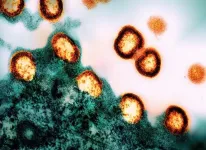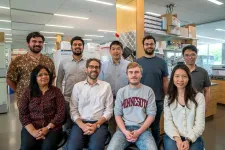(Press-News.org) Saudi women have obtained their citizenship rights through their own struggle and there is little truth in the widely held idea in the West that their role in the fight for their freedom has been negligible.
The finding is part of a new research in the journal Diogenes authored by Zahia Salhi, a professor at Sharjah University’s College of Arts, Humanities, and Social Sciences. The University of Cambridge Press has also posted Prof. Salhi’s research online.
“Far from being passive victims of their society, Saudi women are active agents who possess the tools and the necessary resilience that enable them to militate for their citizenship rights. This goes against prevailing stereotypes, especially in the West,” says Prof. Salhi.
The research comes as Saudi Arabia’s women can now get freely behind the wheel, travel abroad without a male guardian’s permission, apply for passports, and are almost on equal footing to men.
These rights, unimaginable a decade ago, were only honored in response to harsh and long struggle by Saudi women for equality, Prof. Salhi adds.
Prof. Salhi’s research maps out Saudi women’s battle for equal treatment and full citizenship via a vibrant movement, demonstrating that the Saudi women’s course of struggle for their rights is not dissimilar to that of other women’s movements elsewhere.
“My research traces Saudi women’s trajectory to secure citizenship rights and achieve autonomy against the threat of a conservatism that is deeply imbedded in the Saudi socio-cultural fabric,” affirms Prof. Salhi.
Two important epochs in Saudi Arabia’s modern history are highlighted in Prof. Salhi’s research as watershed moments that awakened Saudi women to the fact that their rights have long been usurped.
The first watershed epoch in the pursuit of Saudi women for freedom began with the oil boom of the 1970s that brought in its wake massive wealth, fueling “numerous fundamental socio-historical changes,” Prof. Salhi writes.
The second occurred at the onset of the 1990s. “It is hardly surprising to note that before 1991 Saudi women could not mobilize in a movement to demand their confiscated rights. Until very recently, Saudi women were deprived of suffrage rights, freedom of movement, and the right to own their bodies and act freely without the consent of their male guardians,” Prof. Salhi points out in her research.
The research marks two incidents in Saudi Arabia, which Prof. Salhi says galvanized Saudi women movement, spurring women activists to voice their protest and even demonstrate openly for their rights.
In one incident which took place in 2002,15 girls died and many others were injured when fire broke out in a girls-only school as religious police prevented girls from escaping and barred volunteers to come to their rescue because “the (female) students were not wearing their abayas, possibly because their (male) guardians were not present,” Prof. Salhi writes.
The tragic incident was a game-changer as it emboldened both women and the Saudi government to curtail religious police powers and transfer responsibility for women education to the government-run Ministry of Education.
The incident and subsequent events “led to a wave of protests by female university students … culminating in the protest at King Khalid University in the Saudi town of Bha” in which reportedly nearly 8,000 female students took part, Prof. Salhi notes in her research.
“In the absence of a free national press that would broadcast the true story about their demonstration, the students resorted to social media and posted videos about the event. Furthermore, in a desperate act to let the world know about their ordeal, they reached out to international news agencies by telephone to tell their own story.
“Although the demonstration was brutally put down by the police, this event constitutes a milestone in Saudi women’s mobilization to demand their citizenship rights.”
Another incident outlined by Prof. Salhi as pivotal on the path of Saudi women’s drive for their rights is their defiance of the driving ban.
She mentions several driving protests by Saudi women one of them as recently as 2013 in which hundreds of them, in defiance of religious police and civil authorities, appeared behind the wheel on main streets despite their being fully aware of the consequences.
One main factor assisting Saudi women to stage protests and demonstrate for their rights relates to education which Prof. Salhi sees as a major catalyst for change and women’s ongoing struggle to slacken the grip of the conservative and clerical dominance of the society.
“Saudi women have indeed gained in feminist political awareness and against the fortress of conservative ideology, they have reaped important human rights achievements,” says Prof. Salhi. “Having followed closely the work of the women of the Saudi Shura Council (legislative body), I can affirm that they are not mere ‘cosmetic female representation’ in the council, but active women who have their human rights at heart.”
Prof. Salhi’s research dwells at length with Saudi women’s campaigns for their rights among them the July 2016 launch of the ‘I AM My Own Guardian’ campaign via a hashtag and posts on social media, which eventually culminated in a 2019 royal decree allowing them to travel independently.
“They are intelligent, outspoken, highly motivated, and mostly determined to secure more rights for Saudi women. They demanded legal representation from the state, in the form of full citizenship and governmental responsiveness to their demands as citizens,” Prof. Salhi says, adding that Saudi women’s struggle for rights encompasses calls for social recognition and economic redistribution.
Prof. Salhi believes her research will have good implications, hoping for the findings to change stereotypical perceptions of Saudi women. “They (the findings) will be valuable for international organizations such as Amnesty International, and the United Nations Entity for Gender Equality and the Empowerment of Women.
“I hope the research will help forming a different judgement about Saudi women, who have often been perceived as passive victims of their religion and culture.
“Saudi Women, like their Muslim sisters from across the world, do not need the West to save them from their own people, as often claimed by Western feminists. They know how to fight for their rights, and they know how to achieve them.”
Asked what she would expect from Saudi women reading her research, Prof. Salhi said first she would like them to “feel good about themselves and their important achievements in their quest for becoming full citizens.”
And second, she would be happy if after reading her article, Saudi women’s reaction was “thank you for not describing us as victims.”
The research is part of a larger project Prof. Salhi is considering investigating in the future to include cases of “feminist trajectories from other countries of the Arab and Muslim world.”
END
Saudi women’s quest for change enabled them earn citizenship rights
2024-06-26
ELSE PRESS RELEASES FROM THIS DATE:
Introducing Sir Stanley: Binghamton University professor and Nobel Prize winner knighted by King Charles
2024-06-26
BINGHAMTON, N.Y. -- Binghamton University, State University of New York Distinguished Professor and Nobel Prize Laureate M. Stanley Whittingham has been named a Knight Bachelor “for his services to research in chemistry.”
The honor entitles him to be known as Sir Stanley, or Sir Stanley Whittingham, and was announced as part of King Charles III’s official birthday honours list.
In his 30-plus-year career, Whittingham has been a pioneer in the development of lithium-ion batteries, for which he won the Nobel Prize in Chemistry in 2019. ...
NIH statement on preliminary efficacy results of twice-yearly lenacapavir for HIV prevention in cisgender women
2024-06-26
The injectable antiretroviral drug lenacapavir was safe and 100% effective as long-acting HIV pre-exposure prophylaxis (PrEP) among cisgender women in a Phase 3 clinical trial, according to top-line findings released by Gilead Sciences, Inc., the study sponsor. Lenacapavir is administered every six months, making it the most durable HIV prevention method to have shown efficacy in this population. NIAID applauds the study sponsor, investigators, study staff, and—most importantly—the participants ...
Neurobiologist Joshua C. Brumberg named CUNY Graduate Center president
2024-06-26
The City University of New York has appointed Joshua C. Brumberg as president of the CUNY Graduate Center, making permanent a post he has held on an interim basis since October 2023. Brumberg, a neurobiologist who has been a faculty member, dean and researcher during his 22-year career at CUNY, will lead the University’s renowned center of graduate education, scholarship and public-interest research. CUNY’s Board of Trustees approved the appointment at its meeting last night.
“Dr. Brumberg has played a key role in expanding CUNY’s research enterprise over the past several years,” said Chancellor Félix V. Matos Rodríguez. “A ...
Cell division: Before commitment, a very long engagement
2024-06-26
Before a cell commits fully to the process of dividing itself into two new cells, it may ensure the appropriateness of its commitment by staying for many hours—sometimes more than a day—in a reversible intermediate state, according to a discovery by researchers at Weill Cornell Medicine. Their revelation of this fundamental feature of biology includes details of its mechanisms and dynamics, which may inform the development of future therapies targeting cancers and other diseases.
In their study, published June 26 in Nature, the researchers developed new tools allowing them to track over time the activation state of E2F, a ...
New tool enables faster, more cost-effective genome editing of traits to improve agriculture sustainability
2024-06-26
ST. LOUIS, MO, June 26, 2024 – With the goal of reducing the time and cost it takes to bring an improved crop to the marketplace, research conducted in the laboratory of Keith Slotkin, PhD, and his colleagues in the Plant Transformation Facility at the Donald Danforth Plant Science Center, was recently published in the scientific journal Nature. The publication Transposase-assisted target site integration for efficient plant genome engineering focuses on technology called TATSI (Transposase-Assisted Target Site Integration), which uses transposable elements to integrate custom DNA into specific sites in plant genomes.
The ...
Unlocking the world of bacteria
2024-06-26
Bacteria populate virtually every habitat on Earth, including within and on our own bodies. Understanding and engineering bacteria can lead to new methods for diagnosing, treating, and preventing infections. Additionally, it presents opportunities to protect crops from disease and create sustainable cell factories for chemical production, reducing environmental impact — just a few of the many benefits to society. To unlock these advantages, scientists need the ability to manipulate the genetic content of these bacteria. However, a longstanding bottleneck in genetically engineering bacteria has been the efficient ...
Argonne to support new AI for science projects as part of the National AI Research Resource Pilot
2024-06-26
The U.S. Department of Energy’s (DOE) Argonne National Laboratory will support three innovative artificial intelligence (AI)-driven science projects as part of the first round of awards from the National Artificial Intelligence Research Resource (NAIRR) Pilot.
Led by the National Science Foundation (NSF) in collaboration with DOE and several partners, the NAIRR Pilot aims to provide researchers and students with expanded access to key AI resources and data. NAIRR’s ultimate goal ...
Stress testing pension funds: Lithuanian researchers lead global innovation
2024-06-26
“We wanted to investigate how second pillar pension funds react to financial crises and how to protect them from the crises,” says Kaunas University of Technology (KTU) professor Dr Audrius Kabašinskas, who, together with his team, discovered a way to achieve this goal. The discovery in question is the development of stress tests for pension funds. Lithuanian researchers were the first in the world to come up with such an adaptation of the stress tests.
Stress tests are usually carried out on banks or other financial institutions to allow market regulators to determine and assess their ability to withstand adverse economic conditions.
According to the professor at ...
Multivitamin use and mortality risk in 3 prospective US cohorts
2024-06-26
About The Study: Multivitamin use was not associated with a mortality benefit in this cohort study of U.S. adults. Still, many adults report using multivitamins to maintain or improve health.
Corresponding Author: To contact the corresponding author, Erikka Loftfield, Ph.D., M.P.H., email erikka.loftfield@nih.gov.
To access the embargoed study: Visit our For The Media website at this link https://media.jamanetwork.com/
(doi:10.1001/jamanetworkopen.2024.18729)
Editor’s Note: Please see the article for additional information, including other authors, author contributions and affiliations, conflict of interest and financial disclosures, ...
Solar technology: Innovative light-harvesting system works very efficiently
2024-06-26
In order to convert sunlight into electricity or other forms of energy as efficiently as possible, the very first step is an efficient light-harvesting system. Ideally, this should be panchromatic, i.e. absorb the entire spectrum of visible light.
The light-collecting antennae of plants and bacteria are a model for this. They capture a broad spectrum of light for photosynthesis, but are very complex in structure and require many different dyes to transmit the energy of the absorbed light and focus it on a central point.
The light-harvesting systems developed by humans to date also have disadvantages:
Although ...









